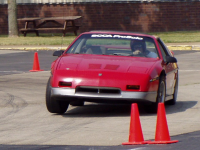- Configuring LinuxCNC
- Basic Configuration
- Wiring VFD alarm(fault) signal to Linuxcnc- what signal to use?
Wiring VFD alarm(fault) signal to Linuxcnc- what signal to use?
- nigel-tufnel
- Offline
- Junior Member
-

Less
More
- Posts: 35
- Thank you received: 0
06 Jan 2017 04:05 #85320
by nigel-tufnel
Wiring VFD alarm(fault) signal to Linuxcnc- what signal to use? was created by nigel-tufnel
I want to have my VFD output an alarm high/low signal to my Mesa 7i76 if the VFD has a fault so Linux can stop motion/abort. I want to prevent cutting with a faulted (stopped) spindle if the VFD faults out for some reason. My VFD can output a high/low signal in a fault condition. What is the best Linuxcnc signal name to use to abort in this situation? Should I use 'estop-ext '? I already have 'estop-ext' connected to my e-stop panic button. Can it be connected to more than one input? Or is there a better signal pin to connect too?
Just to be clear, I am looking for the signal pin name to connect to in my .hal file.
Thanks!
Just to be clear, I am looking for the signal pin name to connect to in my .hal file.
Thanks!
Please Log in or Create an account to join the conversation.
- BigJohnT
-

- Offline
- Administrator
-

Less
More
- Posts: 3990
- Thank you received: 994
07 Jan 2017 13:04 #85400
by BigJohnT
Replied by BigJohnT on topic Wiring VFD alarm(fault) signal to Linuxcnc- what signal to use?
axis.N.amp-fault-in IN BIT
Should be driven TRUE if an external fault is detected with the amplifier for this joint
linuxcnc.org/docs/2.7/html/man/man9/motion.9.html
JT
Should be driven TRUE if an external fault is detected with the amplifier for this joint
linuxcnc.org/docs/2.7/html/man/man9/motion.9.html
JT
Please Log in or Create an account to join the conversation.
- PCW
-

- Away
- Moderator
-

Less
More
- Posts: 17706
- Thank you received: 5178
07 Jan 2017 14:42 #85407
by PCW
Replied by PCW on topic Wiring VFD alarm(fault) signal to Linuxcnc- what signal to use?
It looks like motion should really have a spindle fault input
(at least so the error message makes sense)
(at least so the error message makes sense)
The following user(s) said Thank You: BigJohnT
Please Log in or Create an account to join the conversation.
- nigel-tufnel
- Offline
- Junior Member
-

Less
More
- Posts: 35
- Thank you received: 0
07 Jan 2017 19:30 - 07 Jan 2017 21:16 #85417
by nigel-tufnel
Replied by nigel-tufnel on topic Wiring VFD alarm(fault) signal to Linuxcnc- what signal to use?
Thanks. I got it to work. Is there any reason or advantage to connect this to more than one axis? I have an 3 axis system. All axes and spindle stopped when I hooked up axis.0.amp-fault-in and triggered the signal.
Also, I have another request for best pin/signal to use. I want to input a signal into Linuxcnc that indicates that my stepper motors and spindle have their supply power turned on. This signal is a hi/low signal. Ideally this signal/pin would either show up as an button or not let me run a program until spindle/stepper power on.
Thanks.
Also, I have another request for best pin/signal to use. I want to input a signal into Linuxcnc that indicates that my stepper motors and spindle have their supply power turned on. This signal is a hi/low signal. Ideally this signal/pin would either show up as an button or not let me run a program until spindle/stepper power on.
Thanks.
Last edit: 07 Jan 2017 21:16 by nigel-tufnel.
Please Log in or Create an account to join the conversation.
- Todd Zuercher
-

- Offline
- Platinum Member
-

Less
More
- Posts: 4698
- Thank you received: 1441
07 Jan 2017 22:09 #85427
by Todd Zuercher
Replied by Todd Zuercher on topic Wiring VFD alarm(fault) signal to Linuxcnc- what signal to use?
It doesn't really matter much other than communicating to you which amp is setting the alarm in the alarm message. In a regular closed loop servo system there isn't much need for the alarm, because a problem with the drive will set a following error and trigger a shut down anyway. Where these signals are really useful is with an open loop system such as position mode servos or steppers. Then a problem with a drive needs to be communicated to Linuxcnc.
Please Log in or Create an account to join the conversation.
- Configuring LinuxCNC
- Basic Configuration
- Wiring VFD alarm(fault) signal to Linuxcnc- what signal to use?
Time to create page: 0.076 seconds
